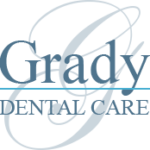We have many patients who come to the office complaining of headaches, waking up in the middle of the night, soreness of the jaw, or symptoms with certain teeth and they don’t have an explanation for what the source of the problem is. When you come to the office many people have healthy teeth and gums that do not require treatment, so what could the problem be?
Many people clench and/or grind their teeth while they sleep. Some do it every single night, and others do it only in times of significant stress. It is simply a way for your mind to deal with stressful situations while your body is at rest during sleep. Some people have no symptoms whatsoever, and others get to the point of discomfort or may develop cracked or broken teeth because of it.
Most people are completely unaware they are doing it because it’s often done during sleep, but once the idea of clenching or grinding is brought up many people will actually catch themselves doing it during the day as well. Because many patients are unaware they clench or grind their teeth and because the thought of wearing a night guard is pretty unappealing I often get asked, “Do I really need a night guard?”.
What Happens If I Grind My Teeth and Don’t Wear a Night Guard?
Bruxism is the medical term for forceful clenching and/or grinding of your teeth. It is considered a major cause of tooth problems because if untreated can lead to jaw pain, headaches, tooth pain, fractured fillings and broken teeth. Some patients will say that they notice signs of wear on their front or back teeth but aren’t always aware of the cause but they obviously know something is wrong.
The action of grinding- where your upper and lower teeth move back and forth with great force against each other- causes your teeth to flatten. Allowed to persist, grinding causes temperature sensitivity, pain because the protective layer of enamel becomes thin, cracks in the teeth, receding gums and eventually the loss of teeth. To fix these problems, we will often need to crown teeth, perform root canals or remove a tooth if it’s not restorable. Grinding can also cause migraine headaches and pain in the shoulders, neck, back and ears. It’s very common for patients to visit the ENT because they think they have an ear infection when all along the issue is clenching and grinding.
Can I Get a Nightguard at My Local Drugstore?
Nightguards that you buy at the drugstore are not custom fitted, they either come in stock sizes or are “boil and bite”. They are usually large, unattractive, poorly fitting and may even come out during the night while grinding. The other issue with store bought appliances is they are made of a rubber-based material that actually encourages you to clench and grind more than you normally do, so it’s completely counterproductive.
Depending on what your grinding pattern is, we prescribe an appliance made of a certain material and shape so it will be most effective. To fabricate a nightguard we simply need to take molds of your upper and lower teeth, and a dental laboratory will make the appliance so it’s custom-fit for your teeth and situation.
Don’t Let it Gather Dust on Your Nightstand
There will absolutely be a significant reduction in tooth wear, symptoms, fractures and broken teeth providing patients with a nightguard actually wear it. If the nightguard sits in a case on the night stand it obviously won’t help solve the problem. It can certainly be difficult to get used to sleeping with an appliance in your mouth but after you get over the “hump” you will find it’s actually difficult to sleep without it.
If you have noticed wear and tear on your teeth, are experiencing any symptoms that you suspect might be from clenching or grinding, or if your spouse complains of the noise you make when you grind your teeth while sleeping, don’t be surprised if we tell you a nightguard is in order. The idea of wearing one isn’t appealing, but neither is pain, broken teeth, crowns, root canals or missing teeth!

